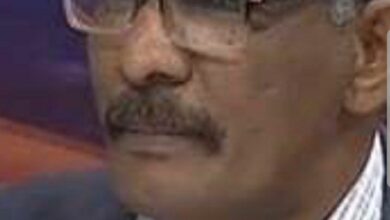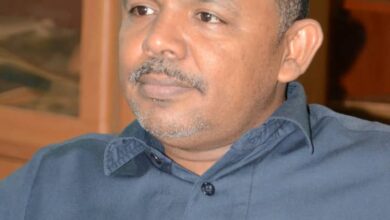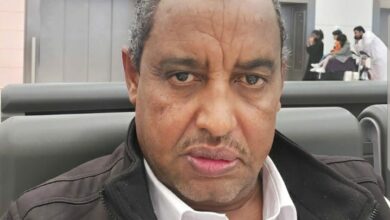
In loyalty to Wad Al-Makki, I am a part of the nectar, and you are the orange.
The Face of Truth.
Ibrahim Shaglawi.
Translation of the passage:
We are a fortunate generation in this world, and we thank God for that. We knew the neighborhood library, the viewing club, the cinema, the theater, the football clubs, Sheikh Al-Fatih Mosque, school activities, and group trips. All these experiences we interacted with, narrating stories and enjoying them in their fullness and vigor. Certain personalities remain etched in our memories, tied to each of these places. When we talk about them all, it is enough to mention our teacher, Abdul Rahim Neishan. He is known to the generation that grew up in the Seventh Block of the Al-Thawra neighborhood in Omdurman, where we moved after living in the Wad Nubawi and Al-Umda neighborhoods. This move, which spanned a considerable time, brought us to a safe, stable home that our father, may God have mercy on him, provided for us in the prime of his life. He was a dedicated employee working in plant protection, moving with his team from village to village, fighting locust swarms and pests until he traveled across all of Sudan in his work.
Our stability after that period of exhaustion was in this prosperous home, surrounded by good company, with open homes where the neighbors were always welcoming. You could only repay them with greetings and a constant smile. Despite the neighborhood’s vastness in both space and time, everyone felt like one big family. My memory holds much beauty, but let me tell you about the neighborhood library, the cultural, intellectual, and political activities, and the generation builder Abdul Rahim Neishan. He understood the importance of books in young people’s lives and established a large library in the neighborhood club, right where Mama Suad’s kindergarten was. He even had to store some books in his own home because the library couldn’t hold them all. Many of the books came directly from Beirut, which was generously publishing at that time, and we read them in Khartoum with reflection and awareness.
We got to know authors like Abbas Mahmoud Al-Aqqad, Anis Mansour, and Yusuf Idris. We also came across thinkers like Atef Al-Iraqi, Al-Taher Wattar, Abdul Rahman Munif, and Fathi Yakan. We read from thinkers such as Ali Shariati, Colin Wilson, and Maxim Gorky. Among these literary giants, it was inevitable that we would also get to know Sudanese writers like Al-Tayeb Salih, Hassan Nagila, Muawiya Muhammad Nour, Mustafa Sand, Saif Al-Dawla Al-Dosouqi, and Hashim Siddiq. Our lives were filled with knowledge from diverse sources, but the moment that struck me deeply was when I came across that elegant collection, designed in purple and white. It seemed to be a first edition, published by a Beirut publishing house. At the time, we were in search of sweet words, profound ideas, and content that sparked our passion for both human and national causes. We were keen on reading and cultural and political engagement.
That is why the poetry collection “Amata” by the exceptional Sudanese diplomat and poet, Muhammad Al-Makki Ibrahim, captured my eyes, which did not leave the lines for a moment. His words were powerful, resonant, and captivating, making you feel as if they were spoken directly to you:
“My nation, awareness, and dream, and anger… tonight, rise in the alleys of the sun, barefoot, without carpets or beards, and with the heart of the season, welcome… In a meadow rich with pomegranates, fruitful with joy… In a moment of play, O God, we were cast forth with the fruits…”
At that age, standing on the threshold of youth, perhaps we didn’t fully grasp the meaning of the words, but they surely spoke to us about the greatness of the homeland—its geography, its people, its history, and its values. Since that moment and those expressive lines contained in that poetry collection, I formed a lasting relationship with literature, poetry, culture, and thought.
Then came our deeper exploration into the worlds of Muhammad Al-Makki Ibrahim, the diplomat, the writer, and the devout Sufi. His vast poetic experience was something we, as a group of friends, eagerly explored, moving between his poems like butterflies flitting among flowers, competing to memorize them and understand their meanings. We could recite by heart the titles of his collections: My Nation, Awareness, and Dream and Anger; The Tent of Al-Amariyah; A Bit of Nectar, I and the Orange You Are; Your City of Guidance and Light in praise of the Prophet Muhammad (peace be upon him), and others that space might not allow me to mention. These collections shaped our awareness of the power of words and the experiences of that extraordinary diplomat, born in Khartoum in 1939, who represented all of Sudan with its unique features. Muhammad Al-Makki Ibrahim, son of the desert and the Nile, graduated from the Faculty of Law at the University of Khartoum before migrating to the United States to specialize in developmental work.
Wad Al-Makki is considered one of Sudan’s most prominent poets and thinkers, contributing to our national unity. Since the 1960s, he enriched Sudanese literature with depth, objectivity, and eloquence, known for his profound love for Sudan, constantly concerned with its people and its national, social, and political issues. Therefore, when discussing him, we cannot forget his masterpiece The October Green Epic:
“In your victorious name, faith and joy grow in the people’s hearts,
And across the forest and desert, it wraps as a shawl,
With our hands, it glowed, light and weapon,
So we armed ourselves with October; we will not retreat a step.
We will strike the rock… until the rock gives us crops and greenery,
And we will guide glory… until time preserves for us a name and memory.”
October was always in our nation since time immemorial. It lived behind patience and sorrows, waiting, enduring, until the dawn appeared.
Our brave national thinker and poet passed away during a time of challenges, trials, and aggression against our country and people, lamenting how the conspiracy—both international and regional—had scattered the sons of this great nation, Sudan. The face of truth is that the departure of Wad Al-Makki is a bitter loss for all Sudanese. He left behind a vast legacy of national, cultural, and intellectual works that upheld national unity and addressed social and political issues while preserving our Sudanese identity. His passing yesterday, after a battle with illness, has left a significant void in the national consciousness and the Sudanese library. May God have mercy on our great Sufi poet and thinker, Muhammad Al-Makki Ibrahim, and grant him paradise alongside the prophets, martyrs, and the righteous. We extend our deepest condolences to his family, friends, students, and the entire Sudanese people.
We belong to God, and to Him, we shall return.
May you all be well and in good health.




